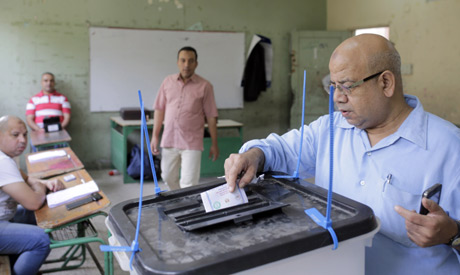
A Candidates' observers watch a voter as he casts his ballot at a polling station of the runoff to the first round of the parliamentary elections in Giza, just outside of Cairo (AP)
Egyptian authorities hoped the country would complete its political roadmap to much fanfare, but the first stage of the long-delayed parliamentary elections concluded on Wednesday in disappointing fashion, with apparent lack of interest from voters overshadowing the elections.
Individual candidates vied for prestigious seats in the House of Representatives in a run-off on Tuesday and Wednesday, but the sight of near-empty polling stations added to a sense of public disillusionment that was evident when the elections kicked off last week.
Local media reported a low turnout rate in the run-offs in most of the 14 governorates where the first stage of the elections took place, with two days off for schools and half working days for public sector employees failing to spur voters into participating.
Only 26.5 percent of the eligible voters cast their ballot last week and the run-offs are highly unlikely to yield better results, with observers and media reporters expecting an even lower turnout.
This latest turnout was also a disappointment when compared to the record 62 percent eligible voters who participated in the first stage of Egypt's 2011 parliamentary elections, which were held months after autocratic president Hosni Mubarak was ousted following a popular 18-day uprising.
Indifferent
Although Egyptian pro-government media has focused on the people's lack of interest in the last step towards a transition to democracy, authorities seemed indifferent, remaining tight-lipped over what a low turnout could mean.
Some analysts have attributed this seeming apathy to a confidence in President Abdel-Fattah Sisi's ability to single-handedly steady the ship, while others say that citizens simply believe their vote will not make any difference because of what they deem as increasingly authoritarian rule by the former army chief, who has been wielding legislative power since assuming office in June last year.
"Weather swings have negatively affected the turnout and made it more difficult for voters to participate," Omar Marwan, the spokesman of Egypt's High Elections Committee, told a news conference on Wednesday.
Marwan was referring to heavy rains in several governorates over the past few days, including in Alexandria where torrential downpour paralysed Egypt's second-largest city on Sunday.
Egypt's foreign ministry also said only 20,000 out of the eligible 682,000 voters abroad have cast their ballot so far, a few hours before embassies shut their doors to electors, including more than 10,000 in Kuwait alone.
Four individual candidates have already won parliamentary seats in the first round, including Abdel-Rehim Ali, an independent candidate and a controversial TV presenter who won in a Giza-based constituency.
The other winning candidates were Mohamed Dessouky and Mohamed El-Basha in two Upper Egypt constituencies, while Gamal Fares won in a constituency based in the New Valley governorate.
There are 222 seats still up for grabs in the first stage in 103 constituencies, but the results of four constitutes were annulled by court orders. The re-election date for those constituents is not yet determined.
The 'For the love of Egypt' electoral list, which supports President El-Sisi, has already won all 60 party-based seats allocated for the first round without the need for a run-off, having garnered more than 50 percent of the votes last week.
The full results of the run-off are expected to be announced on Thursday. The second and final stage of the parliamentary elections will take place on 21 and 22 November.
Short link: